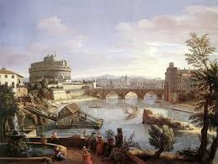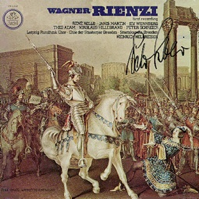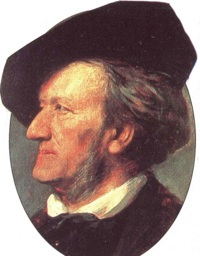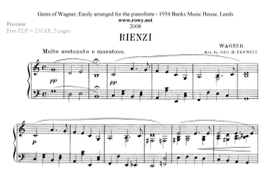_________________________________________________________________________________________
For more about me, click on the image
Cola di Rienzo
From MORTON H.V. A Traveller in Rome, Methuen & Co Ltd, London, 1966, 53-59.
§2
It is strange that Hollywood has not made one of its expensive historical soufflés of the life and times of Rienzo. The Papacy, so the world believed, had become a possession of France, and the Popes had deserted Rome for the pleasant 'prison' of Avignon.
Rome became an endless riot of violent barons. It was a place of red brick towers clustered in the bend of the Tiber, a city of private armed bands, of clashes between Colonna and Orsini, of robbery, of murder and all manner of lawlessness; and it wore once again that air of tragic misery which had descended upon it ages before when, deserted by the Eastern emperors, it became a prey to the barbarians.
In this Rome of the early fourteenth century, Cola di Rienzo, who was born about 1313, grew up a poor lad, the son of a publican. He acquired Latin and wandered among the ruins spelling out the inscriptions and contemplating the past glories of Rome. How extraordinary it is that this dream of Rome was still able to fire men's hearts in a day when the population of the city could not have possessed a drop of ancient Roman blood. Rienzo, dreaming among the ruins, imagined himself a Caesar leading the ruined city into a new era of glory. He was handsome, fanatical, and had the gift of words.
It was the age of Petrarch. The Renaissance was dawning over Italy, and it may be that Rienzo was present when Petrarch was crowned with laurel on the Capitol. So began that odd alliance of art and literature with murder, arson, rape and pillage, which became so characteristic of a later time. How strange to think of the savage lords of Rome gathering on the Capitol to pay homage to the first modern scholar.
At the age of thirty Rienzo was sent on a mission to Avignon, to congratulate Pope Clement VI on his election and to beg him, on behalf of the innkeepers, who formed a great part of the Roman population, to return to Rome. The Pope liked this eloquent visitor so well that he detained him for a year. Upon returning to Rome, Rienzo saw his way clear. He had supreme faith in his star. The nobles laughed at him, and it became the fashion to ask him to dinner to hear him rant, declaim and threaten: but all the time he was organizing the citizens in secret, and bidding them work for the day when the power of the nobles should be overthrown and a 'new deal' established, the Buono Stato, as he called it, in which law, order and peace would rule. He looked even further, to a united Italy, a dream that was not realized until 1870.
He was a born propagandist. One of his methods was to arrange for artists to decorate the walls of Rome by night with allegorical pictures of Faith and Hope and of the widowed and weeping Rome, with angry Apostles, and even the ever new political symbol of the sinking ship. In the morning Rome would awaken and see these cartoons, and dream of the coming revolution. After two years of preparation Rienzo made his 'march on Rome'.

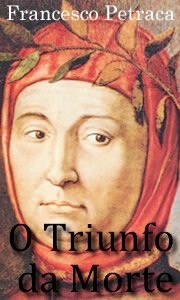
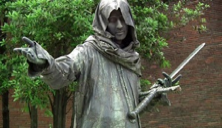
On the morning of May 20, 1347, the bell on the Capitol rang a stormo and the citizens went running there as they had been told to do. Rienzo and his followers had spent the night in a neighbouring church and now marched out, Rienzo in full armour, his head bare, and the banners of Liberty and Justice carried before him. He had chosen his moment well: the Colonna and the other nobles were not in Rome. In a scene of great enthusiasm his golden voice rang out, announcing the rules of the New Deal: murderers should be executed; all law cases should be heard within fifteen days; no house should be destroyed except by the authorities; every district of Rome should have its own home guard; a ship should be kept on the coast for the protection of merchants; bridges, castles, gates and fortresses should be held, not by barons, but by the people; the roads should be made safe and robbers put down; and many more such excellent rules. Without a hand raised against him, Rienzo was given supreme power and took the title of Tribune and Liberator of the Holy Roman Republic.
, Those who remember Mussolini's march on Rome, and the years that followed, will recollect that nothing impressed the world more than the way he made the trains run to time and tidied up the streets. Rienzo's reforms had much the same effect on his contemporaries. Within a month he was writing to a surprised Pontiff to say that the roads were safe and that life in Rome was quiet at last. A contemporary wrote that 'the woods rejoiced, for there were no longer robbers in them. The oxen began to plough. The pilgrims began again to make their circuits of the Sanctuaries, the merchants come and go, to pursue their business. Fear and terror fell on the tyrants, and all good people, as if freed from bondage, were full of joy.' Old Stephen Colonna, who, at the news of Rienzo's triumph, had galloped back to Rome, threatening to 'throw this fool out of the window of the Capitol', had to fly for his life, and the nobles who had once laughed at Rienzo were forced to swear allegiance to him. So began his reign of seven months. Rienzo proved that he was a brilliant Senator, but a deplorable Caesar. Like his recent successor, when he gave up local matters for world affairs, he ruined himself by his own follies.
His vanity and his sense of the theatre were tremendous. He rode about Rome dressed in silk, half green and half yellow, furred with miniver, and a wand of steel in his hand on top of which was an apple of silver-gilt in which was a fragment of the Holy Cross. One day he decided to knight himself.
In the Baptistry of the Lateran is a basalt font in which it was once erroneously believed that Constantine the Great had been baptized. Rienzo spent the night in the Baptistry and took a bath of purification in the font. In the morning the crowds saw him stride out on the balcony of the Lateran Palace, clothed in scarlet, with the gold spurs of knighthood at his heels. The trumpets sounded and he addressed the crowd from the balcony; and the mind leaps forward six centuries to the balcony of the Palazzo Venezia. His voice was no longer that of the chief magistrate; it was the voice of an emperor. As he called upon the Pope to return to Rome, the startled protests of the Papal Vicar were silenced with-a roll of drums. He claimed the right of choosing the German Emperor, a right, he said, invested in the people of Rome. He commanded all who disagreed with him to appear in Rome and give their reasons on pain of his sovereign displeasure. That night there was, a great banquet. The nostrils of the horse of Marcus Aurelius spouted wine.
Rienzo's coronation was a ceremony devised by himself. High dignitaries of the Church placed a number of symbolic wreaths upon his head, of ivy, laurel, myrtle, of weeds gathered on the Arch of Constantine, and as each crown touched his head, a beggar, standing behind the throne, took it off and impaled it upon the point of a sword. Yet wrapped up in all this symbolism was an idea. He had invited envoys from the Italian cities to attend his coronation and he now married their cities to Rome with rings of gold. So the emperor of words and symbols was the first to visualize a united Italy. Yet what an exasperating mountebank he was! His life was a series of scenes and curtains. When he received a papal legate, sent to rebuke him and call him to order, he went to the vestry of St Peter's and donned the dalmatic worn by the Roman Emperors at their coronation.
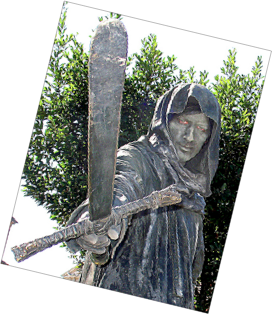
Living statue of Cola di Rienzo, Rome
His fall was hastened by a tactless drama in which, as usual, he had cast himself as hero. During a banquet he suddenly arrested all the nobility of Rome. He sent confessors with the Sacrament to them and in the morning they were led into a hall draped for an execution. As the nobles appeared before him, many on their knees begging for their lives, Rienzo descended from his tribunal and made a speech on the virtues of forgiveness and—invited them all to dinner! They left hating him and swearing to be revenged.
Open war soon broke out between the nobles and the citizens, and at the thought of wearing armour for anything but a procession, Rienzo grew pale and trembled. Nevertheless he went, shaking with' fear, to battle. There was a fight in a pelting rainstorm at the Porta San Lorenzo in which many nobles were slain, and, more by luck than skill, the citizens won the day. Rienzo, who had not struck a blow, now believed
himself a paladin. He solemnly dedicated his sword on the altar of S. Maria in Aracoeli. The Pope, offended by his arrogance, commanded the people to desert him, and after seven histrionic months they were willing to do so. Realizing that his play was over, he cried, 'Now in the seventh month am I driven from my dominion!', and fled for refuge to the Castel S. Angelo. The news of his abdication spread through the bewildered city, for there had been no rebellion. Through the puzzled crowds in front of the fortress pressed a slim young monk. It was his faithful wife finding her way to him in disguise.
Rienzo lived for another seven years, some say in the Abruzzi, among hermits and visionaries. Soothsayers promised him a new reign of glory and fame. One day he disappeared from the mountains and went to the Roman Emperor at Prague, who immediately handed him over to the Pope at Avignon. Clement VI had died and had been succeeded by Innocent VI, who saw in Rienzo a possible solution to the problem of the continued anarchy in Rome. Could he exert the old spell? The Pope thought it might be worth trying. So Rienzo, once again clothed in splendour, was sent to Rome with a papal force. The people remembered the brave shows of their old Tribune and swarmed out to meet him. They saw, however, not the romantic Rienzo of other days, but a gross, fat man. One who knew him wrote: 'He had a paunch like a tun, triumphant, like an Abbot Asinico. He was full of flesh, red, with a long beard. His countenance was changed, his eyes were as if they were inflamed—sometimes they were red as blood.' This was indeed the final drama. Could the old actor stage a come-back?
He was now a changed man. Fate had given him a second chance. 'He had no money to pay his soldiers,' says his biographer. 'He restricted himself in every expense; every penny was for the army. Such a man was never seen; alone he bore the cares of all the Romans.... He gave orders and settled everything, the times of attack, the taking of men and spies. It was never ending.' He had even become brave. Rienzo the actor had at last become a man of action; but, 'there is a tide in the affairs of men'and Rienzo had neglected it. It was too late.
The Romans wanted more theatricals. They did not like this strange, hard Rienzo who taxed them instead of making speeches. They wanted trumpets and pageantry; but instead they were getting new taxes on salt and wine, and conscription. In his youth Rienzo had often appeared to be drunk with power and glory; now in his middle age, when he was a tippler, he appeared most sober. The Romans shrank from his energy and his demand for sacrifice. At last, when he was capable of bringing about the Buono Stato, his followers would not have it.
One morning, as he lay in bed in the Senator's Palace on the Capitol, having just 'washed his face in Greek wine,' as his biographer slyly described his breakfast, he heard a furious crowd shouting 'Death to the traitor!' In the old days he would have rung the Patarina and summoned the guard; but at last, it seems, he had become an ancient Roman. Dressed in armour and grasping the banner of Rome, he tried to speak to the crowd. They would not listen. He turned back to find himself alone in the palace, and soon he smelt burning and knew that the mob had fired the main gate. One chance remained to him: to die bravely. He threw it away. Knotting his bed sheets, he let himself down into a courtyard, having first cut off his beard and thrown a few rags over his grand clothes. He forced his way out into the crowd, joining in the shout of'Death to the Traitor!', until someone, seeing the gold armlets under his rags, recognized him. The mob dragged him to the foot of the great flight of steps to S. Maria in Aracoeli, where in those days criminals were executed, and there he stood for an hour, no one having the courage to kill him.
His face was 'black like an oven', he was clad in green silk, with the purple stockings of a baron. He stood with folded arms, until at last a man called Cecco del Vecchio took a sword and plunged it into his body. He was dragged by the feet to San Marcello, where for two days and nights he swung head down. On the third day the body was dragged to the Square in front of the Mausoleum of Augustus and was burnt on a pile of thistles.
If you look down from the Cordonata into the little hollow to the left as you go up to the Capitol, you will see an undersized statue of a man in a cowl.
That is Rome's rather grudging tribute to one, who, in some ways, was born out of his time.
Until here the account of H.V.Morton, “A traveller in Rome”. I hope you liked it, and next time you come to Rome, try to visit it with his diary in Your hands.
A shame that Hollywood never made a movie of his life, all the ingredients are there: Rome in decline, baronies fighting with each other, luxury lifestyle of popes in Avignon, revolution, Coronation on the Capitol, Petrarca, madness, his wife dressed as a monk, the Angel Castle, public execution. Wha...oh !! if that not suffice?
But a great composer did it. Richard Wagner dedicated his first opera to “Rienzo”. Unfortunately, most of it was lost in the Second World War.
